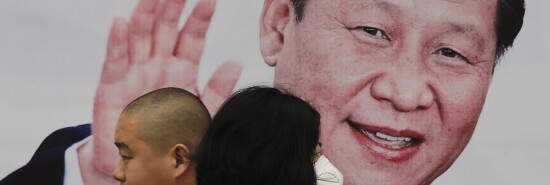
Keep focused on China’s vast espionage campaign
Tom Rogan
Video Embed
National attention is focused on the three unidentified flying objects recently shot down by the U.S. military. Still seeking answers as to who launched those UFOs and why, we must also remain focused on the singular espionage threat posed by Communist China.
The Chinese spy balloon downed off South Carolina on Feb. 4 is just a metaphor for Beijing’s vast intelligence apparatus. And unlike the balloon, that apparatus is very far from deflated.
For a start, it’s important to single out the “Communist” when it comes to Chinese intelligence activities. While the U.S. military serves under authorities of constitutional and federal law, the People’s Liberation Army and the various other elements of the Chinese security state are explicit servants of the Communist Party. Their obligation of service is to the party rather than the state. So when party leader Xi Jinping orders something, or when the party sets an ambition, the security apparatus has great incentive to obey. An unstated but subsuming desire to please or avoid offending senior party officials both drives and complicates Chinese intelligence activities. This bears particular note with regard to Taiwan. A growing number of U.S. military and intelligence officials believe China is likely to launch an attack on Taiwan before this decade is out. Geography and the PLA’s relative force disposition mean that China has a strong possibility of conquering Taiwan, even if the U.S. military intervenes.
China’s threat to the U.S. reaches far beyond the contingencies related to Taiwan, however. China’s key espionage focus comes via its cyber and signals intelligence campaigns. At a basic level, this effort centers on accessing U.S. communications and associated data moving across networks or otherwise accessible to monitoring. On one side, there’s Beijing’s use of telecommunications firms such as Huawei and TikTok as deniable backdoors for future intelligence collection.
WHEN IT COMES TO CHINA, IS THE PENTAGON’S COLIN KAHL LIVING ON ANOTHER PLANET?
Then there’s the service of the PLA’s Joint Staff 2nd Department, Intelligence Bureau, the PLA’s Strategic Support Force, and the Ministry of State Security to hack into, steal from, or otherwise intrude within protected networks. Their work sees tens of billions of dollars in U.S. intellectual property stolen each year. It sees the PLA strengthened at the expense of U.S. military advances. China’s 2014 hack of the Office of Personnel Management evinced the grand ambition involved here. The OPM hack was intended to support targeting operations for the recruitment of American government personnel and contractors as Chinese spies.
At the human intelligence level, also, China leverages corruption across Africa and Asia to co-opt politicians and influential persons. Pakistan’s transition into a de facto outpost of the Chinese Communist Party illustrates how China uses its wealth to buy loyalty. The same principle applies to the supplication of the Solomon Islands to Beijing’s Pacific agenda. Moral questions aside, another key advantage of the one-party Chinese state is the ability of Communist Party officials to exert active and implied control over domestic businesses and their operations. There is no longer such a thing as a truly private major corporation in China.
A very large network of agents sympathetic or coerced into Communist Party service also work abroad in intelligence support, cultivation, and targeting roles. Their effort includes the use of sex, blackmail, and the laundering of Communist Party money for political donations and advocacy activities. Seeking long-term influence, Chinese intelligence services target not just high-profile U.S. politicians at the federal level but state and local politicians at early stages of their careers. Chinese intelligence officers are increasingly well-trained and supported by a huge supporting infrastructure to better enable their operations. The dedication of these officers to the party’s interests is attested by the significant effort placed on harassing Chinese citizens abroad who are deemed insufficiently loyal to the regime.
Most relevant to Americans, all of this is about far more than simply advancing the CCP’s interests. Xi’s ultimate ambition is to replace the U.S.-led democratic international order with a Beijing-led feudal mercantile international order. That is to say, an order in which individual freedom, rule-of-law rooted trade, and political sovereignty are subordinated to CCP whims.
